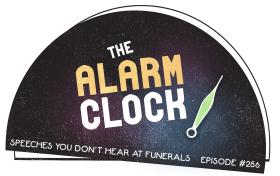
Christmas, 1985.
Boy, it was really something, and when I say the Schumacher household, I mean our household, and when I say there was an incident, it was little Benny who started it. It was Benny and Frosty the Snowman. It was Rudolph and the Little Drummer Boy — and even Fred Goddamn Flintstone. All of them rampant Christmas-ruiners, right to the very last.
But what a clock it was.
See, Benny got the alarm clock for his birthday, in July of the same year.
Rocky IV was smashing it at the cinemas, and so were those kids from the Goondocks. How freaking good was The Goonies? How great were the villainous Fratellis? And I can’t even talk un misty-eyed about Chunk doing the truffle shuffle , or Data and his inventions. Who knew that Josh Brolin — playing the long-suffering older brother, Brandon — would later star in Cohen Brothers movies and be nominated for an Oscar? In The Goonies he rode a stolen pink tricycle through the woods. Who gives a shit about the Cohens? The Goonies is still his best movie.
As for Rocky IV, when Benny was nine, and I was eleven, we both smelled a rat when the Russians started barracking for Rocky — but we still found ways to forgive it. Suburban Sydney felt far from the Cold War. Better to remember Ivan Drago (aka Dolph Lundgren) professing, ‘His jaw is made of aiyon.’ Dolph looked really good. He was pumped to the brim with biceps, and his hair was a bright-blond flat-top. The eighties were that damn good.
But this doesn’t explain what I’m here for — to tell you of Christmas Eve that year, and the incident with Benny and the clock. No, it’s backdrop, purely that.
See, what we did as kids back then was ride up to Upstairs Video, and hire movies overnight. We’d watch them later that evening, then again next day in the morning. Those movies marked our summers. With Mum and Dad at work, our days were spent playing cricket outside, or riding bikes around our suburb.
Then evening came, and video time.
Then again, next day, early morning.
Our dad would be up already.
He was always up first, for work.
He’d traipse through the lounge room with tea and toast. ‘Oh,’ he’d mutter, ‘The Jedi again,’ or ‘Raiders’ for the Indiana encore.
When our dad was nine he was war-torn. He had toothaches, no food and Russians. They occupied his town. At eleven he joined a gang. They once sent a flare into the soldier camp, and he didn’t stop running till the gunshots stopped. Probably a good few kilometres.
And here we were, watching videos.
The Good Life, 101.
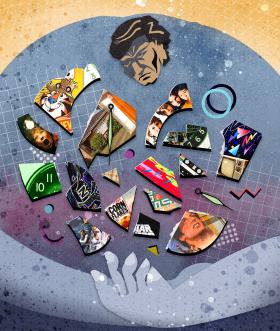
First was Sue, then Anita, then me, and fourth was Benny.
Our mum was Helena Schumacher. Our dad, unfortunately, named Helmut.
We got bagged at school for Helmut as a name, and were often branded the krauts. A kid once called me a Nazi, and I wanted to be angrier than I was. It was balanced by things we loved, though — the things that made us different. Like for us it was Christmas Eve that mattered; Christmas Day was for suckers. We had weird words for things like dish cloth. Even our own kids call it a luppy.
Our dad built houses, our mum was a cleaner, and Dad was incredibly handsome. (Actually, years later, when we looked through photo albums, I said, ‘Shit, Mum, look at Dad — he looks like Jimmy Dean!’ And Mum, still lovely, but well-wrinkled by decades with our father — she’d been pretty severely Helmutted — looked over, grit- eyed and hardened. She said, ‘Don’t tell him that, that bastard.’ Then both of us duly laughed.)
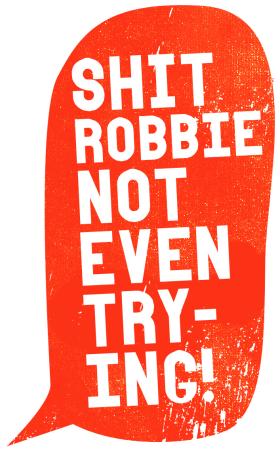
(Raise your hand if you ever copped a spray. See? I knew it, I knew it!)
He yelled at us while we played football. God, that accent commanding the sideline. ‘Go, Robbie, go for the corner!
Shit, Robbie, not even trying!’
In later years, Benny broke his cheekbone in a bike fall, and first game back he tried his guts out, like always. After, when he got in Dad’s Kombi, hoping for a compliment, it was, ‘You missed four tackles, and they were beauties.’
He wrecked every remote control he ever laid hands on, and don’t get me started on the electricity. ‘WHO LEFT THE LIGHT ON IN THE BATHROOM?!’ And Jesus, God almighty, I think half the street remembers when Sue had the gall to wash her hands while he was out in laundry, showering. Never interrupt a spoilt immigrant’s warm shower. Freeze him and you get yelled at. Scold him and you might nearly die.
One of the worst was forcing Mum to walk all those extra miles in the mountains, up to some piece of shit hut in the distance. ‘Come on, just a little further.’ Her knee was kaput the whole year.
We all had our moments with Helmut.
But little Ben’s was the ultimate, a triumph.
Every year, before the blitzkrieg of summer video, there were the top five yuletide specials. They screened on Channel Seven.
Number one was Little Drummer Boy. (Never mind those puppets were just, odd.) Then Rudolph the Red-Nosed Reindeer. Number three was definitely Frosty. (Who could forget his ‘HAP-PY BIRTHDAY!!!’ when the top hat brought him to life?) To be honest, it was really just a top four, because all these decades later, my memory stops at The Flintstones Christmas — a certified December classic.
Early in the month we already scoured the TV guide.
In years gone by, they were listed.
In ’85, though, things were different.
For whatever reason, in 1985, those Christmas cartoons weren’t shown.
Benny, as the youngest, and always forging towards us — always pissed off because we all went horse riding with Dad at Otford Valley while he had to sit in the car with Mum — was always first to find them. If there was a trophy in our family for Most Keen, that was Benny in a nutshell. Keenest to swim, keenest to run, keenest to jump from the fence into a pool, he was always catching up. I remember learning to surf, and we’d be away, near the beach, and he’d always go over and check it. He’d fly back on his bike and wake me.
‘Hey, Robbie,’ he’d whisper, ‘Robbie!’
Me, I was lazy, I’d grumble. ‘What?’ ‘You comin’ out, Robbie, it’s good!’
You don’t think of a hiss being cheerful, but he was surfing those waves as he spoke. In his mind he was already out there.
‘How big is it?’ I’d ask. ‘Maybe shoulder.’
‘Is the water bumpy or smooth?’ (God, I was deplorable. Lazy. Contemptuous.)
Now he’d be really frothing. ‘Smooth as a baby’s backside,’ he’d say.
Eventually he gave up on me, and he surfs alone to this day.

The alarm clock.
Tell us about the alarm clock!
Okay.
So, none of those Christmas cartoons had aired so far that December, and for Benny there was one conclusion. They were saving them for Christmas Eve, in the morning even if unlisted in the program.
On the night of the 23rd, he lovingly set his alarm clock — and finally now, I’ll describe it:
It was white and gloriously substantial. Not like the cheap shit you get these days; it had bulk. Shaped like an arch, it had glow-in-the-dark hands and numbers; fluorescent green on black. To set it, you slid a ribbed segment upwards, only a few millimetres, and when it went off you just pushed it down. Simple. Beautiful. Timeless.
And Benny loved that clock.
It woke him up before the world, it seemed. The time he needed to catch us.
The problem, of course, was what happens now and then, when we need to rise early for work, or study for that exam — our body already knows. We wake before the alarm. Have you ever been standing in the shower while that sound rings out through the house?
So think of ’85 now, and Benny’s beautiful clock.
The era demanded décor.
Brown carpet, orange curtains.
Benny sat wide-eyed on the L-shaped couch, praying for order in the madness. I mean, come on, Christmas demanded Christmas cartoons, both the biblical and the ridiculous. What he got was fucking Thunderbirds.
But then — it’s funny how worries become real worries, and complaints become natural disasters … because then, right then, he realised. Several facts descended.
- There’d be no Little Drummer Boy this year.
- He’d just seen Helmut half-stumble through the hallway in his pyjamas.
- Our dad wasn’t going to work that day — his first day off in months, and that included weekends.
- Helmut didn’t look happy.
- Oh, Jesus, oh shit.
Oh, yes — it hit him pretty hard, from the throat, to the lungs, to the scabs on his scrawny legs. Fear and abject anxiety, as he mouthed the words, to himself:
The alarm clock.
I forgot to switch off my alarm clock!
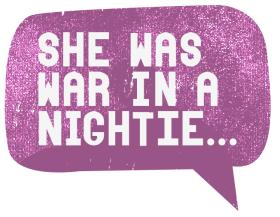
He had the perfect horrific vantage point, as our father walked Ivan-the-Terrible-like, into our small shared bedroom.
(Okay — an important note:
In the thirty-five years beyond this episode, Benny still reproaches me, for being asleep in bed, on the other side of our room. ‘You!’ He points that youngest-of-us finger. ‘You!’ He shakes his mocking head, the hair gone darkish brown now, but his smile still open wide. ‘Just once, you lazy bastard, you could have woken up and turned the alarm off — but no! You were snoring your useless arse off!’ And he’s right. Even when we re-watched all those videos, he always came and woke me.)
All he could do was sit now, and wait for the car crash to happen.
His feet began to sweat.
Dad studied the clock in his palm.
For a moment it looked quite innocent — I mean, what kind of grown man doesn’t know how to switch off a bloody alarm clock?!
But then the seconds bled out like dying men. There’d be something cartoonish here yet.
You wanted something special, and biblical?
Well — our dad gave up on wondering, and smashed the clock to the floor. Then, very casually, he wandered on back to bed.
Sitting in shock and awe, Benny was now permanently glued. Or sticky- taped down, at the least.
He completely believed what he’d seen.
The best part was how the clock didn’t shatter spectacularly, but jigsawed into seventeen pieces.
Later on it was pronounced unfixable.
But there was still some ticking ahead of us.
As Benny was about to stand, our mum appeared in the lounge room. She was in her summer dressing gown — pink with patterns of frangipanis. She didn’t look at Benny.
Not good, he thought, at all.
See, Helena’s one of those people. She’s glorious and trim and gregarious. She worked hard and loves stories and people. Her laughter is warm, it’s generous. She agrees with what people say to her. She’s a mother, a talker and diplomat.
But that morning?
Not a word, not a nod, not an anything.
She was war in a nightie and dressing gown.
Her blonde-fuelled hair near ignited.
The back door opened and slammed.
Benny didn’t know how many times he said Oh, shit that morning — all in the time it took our mum to smash the mugs Dad was giving her for Christmas. They were rustic or country, or some bullshit, and she’d dispatched them out in the garage, still in the plastic bag.
On her return, she stalked the kitchen, then straight back through the lounge room. On her way past what we now call the Russian Dolls of Miniature Side Tables (there was a bigger one, a medium one, a tiny one), she picked up the board game on top. It was a rip-off of Monopoly, called Careers — and us kids were all big fans of it, and so was our mum, that morning.
Still not a word was spoken as she picked up the oblong box, and made her way towards her bedroom, where Dad was now blissfully slumbering.
You bastard, she thought, you bastard, and proceeded to smash him right across the face with the entire Careers board game, over and over again. Even as he shocked awake, almost drowning, thrashing at sea, she kept going. Her voice was the pitch of an angel, on her way to the bottom of hell.
Finally, Benny jumped up.
He made it into the hallway, where Anita brushed past him in a blur, trying to pull Mum off Dad, the board game long since thrown at him, and her heavy old jewellery box, too. (If she’d got him in the head it would have killed him.)
Fake money was floating from the ceiling.
From the corner of his eye, while the storm raged on, Benny saw something amazing — well, amazing and truly troubling. It could only mean sheer catastrophe, because there, to his left, in the hallway, Sue and I were hugging each other, and that had never happened before, at least not in Benny’s lifetime.
Oh, shit, he thought again. This is a total disaster — and all of it’s all my fault.
But what happens in the wake of moments like these?
Our mum just went to work.
Benny was crying in the garage, above those broken mugs.
As for our dad, Helmut Schumacher, there was still some gold to come. It’s always a thing with families, I think. There’s always more story to come.
First was something we knew about the man, of a particular gift for self-melancholy — where he’d perform the greatest tantrum, but then you had to feel sorry for him.
Mid-morning, he sat in our bedroom, against my bed on the floor.
The alarm clock pieces were unsolvable, and he sat there, dejected, depressed. He was constantly fat-then-slim our dad, and this was a typical fat stage, which made the dejection worse. The sense of observing the pathetic. He sat between those mismatched beds, muttering his swollen mantra. ‘I’m such a bastard, such a bastard …’
And who was sitting next to him? Of course, it could only be Benny.
It’s a favourite comical moment of mine: The kid consoling the dad.
He sat there quietly answering. ‘Nah, you’re all right, Dad … You’re not that bad ...’
He was holding the face of the wreck in his lap, watching the bright-lit clock hands.
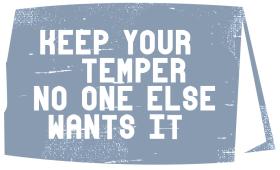
The forlornness of boy, clock and man? No.
For there was still more patheticness ahead!
See, once the self-loathing wore off (and it wore off fast with our dad) Helmut soon had a plan — for at heart he was really quite generous. He took little Benny to the shops. He would buy him, of course, a new clock. But it was nothing like the first one. There were none left of those on Earth.
What they bought was a pale comparison: Greyish, and meek, but passable.
Next, though, came the clincher, where Helmut positively outdid himself. On a whim he entered Granny May’s, full of stationery and inappropriate birthday cards, and placards to inspire your desk. To us, he was the only man alive who could smash his son’s alarm clock on the morning of Christmas Eve, and see fit to buy a present for himself. At some point I’m sure he imagined showing it proudly to Helena. A small triangular placard, to remind him:
KEEP YOUR TEMPER. NO ONE ELSE WANTS IT.
Ridiculous.
Even Benny was noncommittal on that one, shrugging his shoulders sadly, knowing it wouldn’t fix Christmas. It would only breed more contempt.
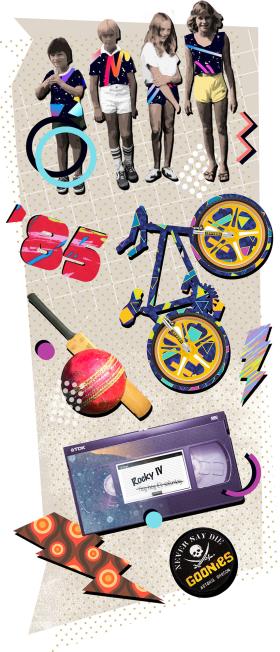
At the end of the day, new alarm clock in hand, Benny sat in our room.
Around 4 pm, when Mum came in, he was on the edge of his bed, not game enough to really show her. (The new clock hands didn’t glow, by the way, they were shit.) Even when she looked down, passing judgement on the clock, he could sense her body still burning.
The rest of us all were blue-eyed, like Dad, but Benny’s were brown, like Helena’s. (I’m not sure why that’s important, but it is. As youngest it tied them tightly, maybe, like she was the gift in him.)
I don’t know anymore if he cried that afternoon, but I recall things going like this:
‘I’m sorry I ruined Christmas, Mum.’
‘You didn’t ruin anything.’
Then the longest of longest pauses. ‘So, um —’, he said. ‘Hey, um, Mum …’
It took all of his nine-year-old nerve.
‘So, um, are …’ He swallowed. ‘Are you gonna leave Dad?’ His tremble of voice between them. ‘Are you going to get divorced, and leave him?’
And our mum, Helena Schumacher — the toughest woman I know, who swears with a German accent, always playful and smart and gregarious — she put her hand down on his head.
She smiled but was then dead serious. Enchanted by Christmas fury.
She could have said so many things, like, ‘Don’t be silly, son, these things happen, it’ll blow over, it’ll be okay.’
But she didn’t.
This was not quite Rocky IV, or those Goonie kids saving their neighbourhood.
She told him, ‘I don’t know.’
And me, I don’t know either, why I’m telling you all this now, with Helmut, now ashes, behind me. Maybe seventeen million pieces.
I loved growing up how we did.
Love you, Dad, you old prick.
Markus Zusak is an award-winning author of six books including Bridge of Clay, The Book Thief and The Messenger.
This story appears in Openbook autumn 2021.
